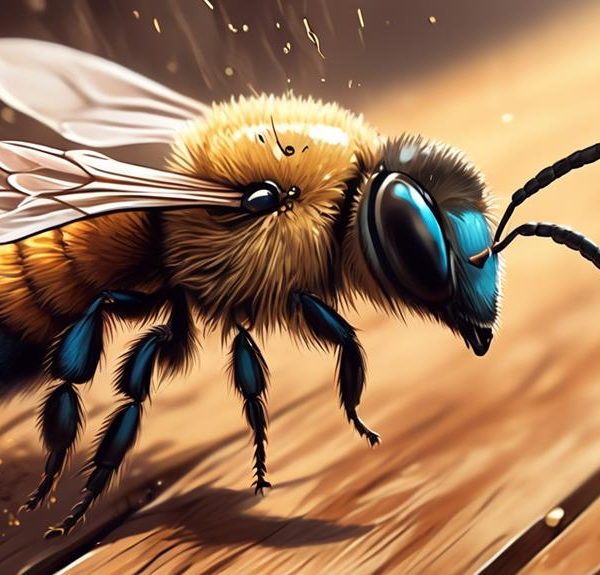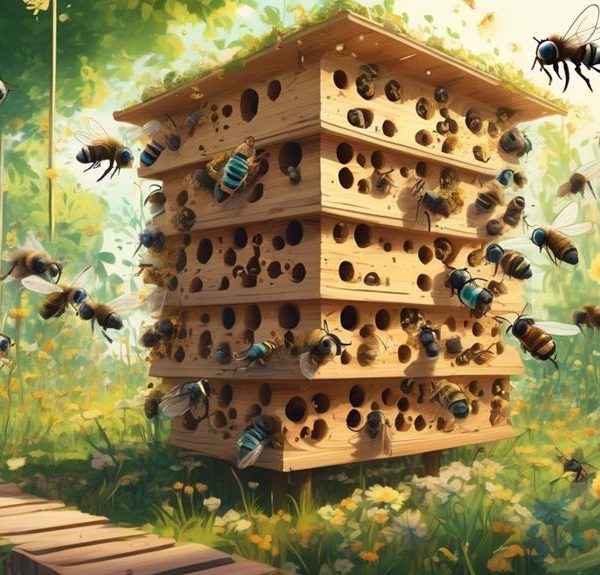Peek behind the benign reputation of mason bees to uncover potential damages they might cause, in a narrative that challenges popular perceptions.
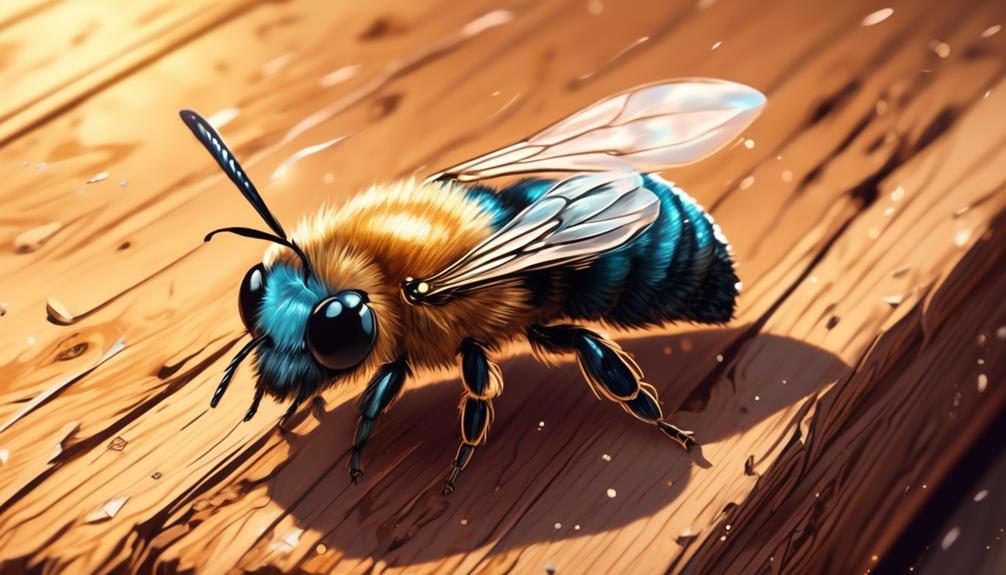
Do Mason Bees Cause Damage?
As the old saying goes, 'not everything that glitters is gold,' and in the world of bees, the same principle might apply.
You've probably heard about mason bees, harmless pollinators that are often hailed as beneficial to our environment. But have you ever stopped to ask yourself if this is the full story? Could there be potential drawbacks or damages associated with these creatures, lurking beneath the surface of their shiny reputation?
Stick with us as we take a closer look and unfold this intriguing narrative.
Key Takeaways
- Mason Bees are beneficial for pollination and contribute significantly to plant growth.
- Mason Bees are non-aggressive and pose little threat to humans.
- Providing a suitable habitat and regular maintenance of bee houses can help mitigate risks associated with Mason Bees.
- Mason Bees have a short lifespan and limited range, which limits their ability to replace honeybees entirely.
Understanding Mason Bees
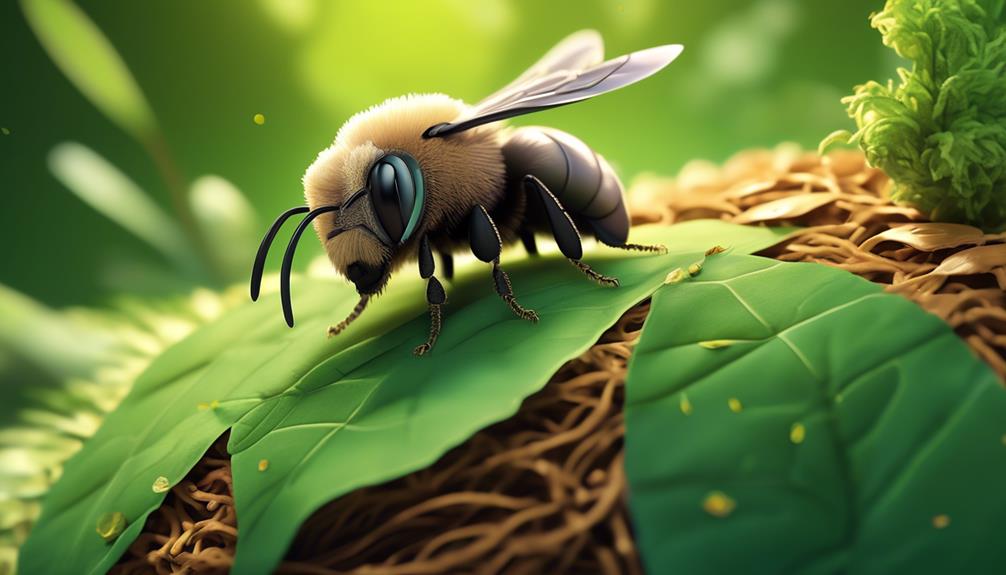
To fully grasp the nature of Mason Bees, you need to delve into their unique biology, behavior, and ecological role.
They're solitary bees, meaning they don't live in hives like honeybees or bumblebees. Instead, each female is a queen and constructs her own nest, usually in hollow stems or pre-existing cavities, where she lays her eggs.
Let's talk about their biology. Unlike honeybees, Mason Bees aren't equipped with a barbed stinger. This means they can sting multiple times, but they're less aggressive and rarely sting unless threatened. They're also smaller in size, about the length of a housefly.
Their behavior is fascinating. You'll often see them carrying mud, which they use to build partitions between each egg in their nest. Hence, they're called 'Mason Bees'. They're phenomenal pollinators, too. They gather pollen on the underside of their abdomen, which transfers effectively to flowers as they move about.
Ecologically, Mason Bees play a crucial role in pollinating plants, contributing to biodiversity. They're particularly efficient at pollinating fruit trees, which makes them invaluable in orchards. Their solitary nature and mild demeanor also mean they coexist peacefully with humans.
Mason Bees: Friend or Foe?
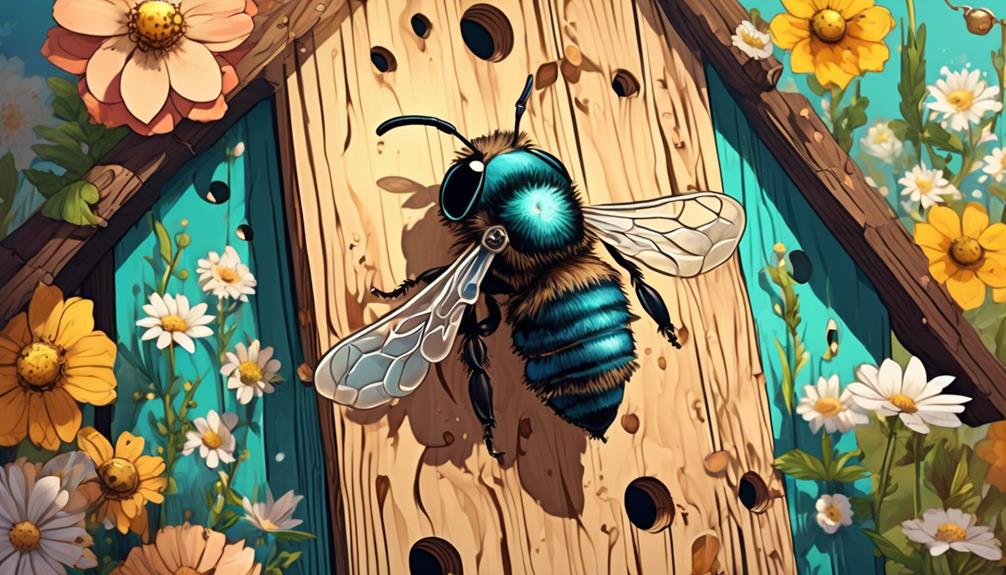
Understanding their biology, behavior, and ecological importance, you might wonder if Mason Bees are more of a friend or a foe. Let's explore this by considering their impact on the environment and your home.
Friend | Foe | Neutral |
|---|---|---|
Pollination | Nesting in Homes | Don't Produce Honey |
Non-Aggressive | Short Lifespan | Not Social |
As pollinators, Mason Bees contribute significantly to the growth of plants, including those that make up your garden. They're non-aggressive, posing little threat to you. It's also relatively simple to attract them to your garden.
However, they might nest in your home's crevices, which could be considered a downside. Their short lifespan and limited range mean they can't entirely replace honeybees.
They're neutral in terms of honey production – they don't produce honey like their honeybee cousins. They're also solitary, which might be seen as a neutral trait depending on your perspective.
Potential Damages by Mason Bees
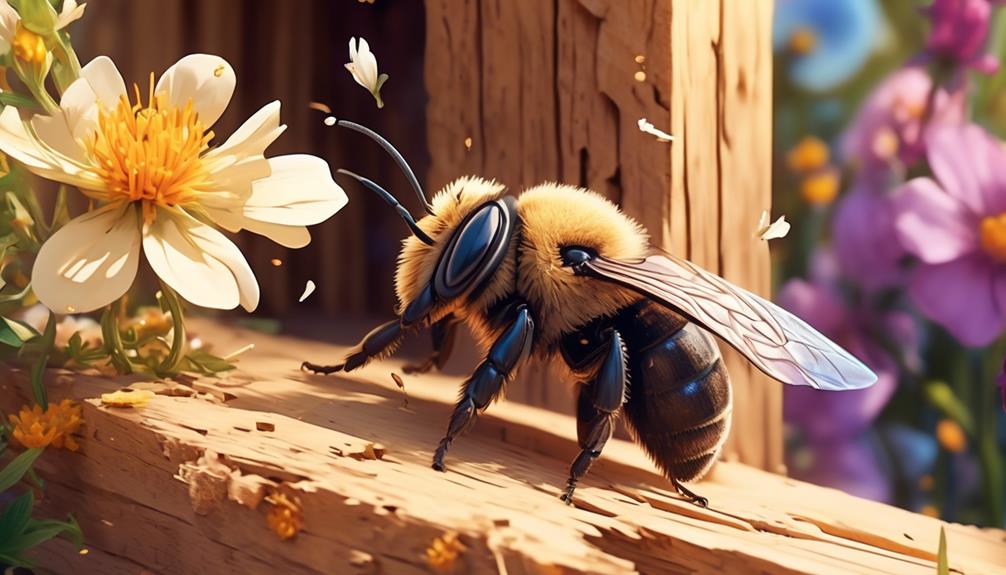
While Mason Bees are largely beneficial, it's also crucial to consider potential damages they may cause, particularly related to their nesting habits in residential structures.
These industrious insects prefer to nest in small cavities, often choosing existing holes in wood or hollow stems of plants. If you've noticed a sudden appearance of small, round holes in your wooden structures, you may be hosting a Mason Bee colony. Over time, these tiny holes can lead to structural damage if not monitored and managed correctly.
Apart from the physical damage to the wood, there's also the aesthetic impact to consider. Mason Bees' nesting habits often result in unsightly mud patches, as the female bees seal the entrance of the nest with mud. While this doesn't harm your plants, it can be an eyesore, particularly on light-colored surfaces.
While the damage caused by Mason Bees is typically minimal and far outweighed by their pollination benefits, it's important to keep a balanced perspective. If their nesting becomes problematic, consider installing bee houses to redirect their nesting activities.
Mitigating Risks With Mason Bees
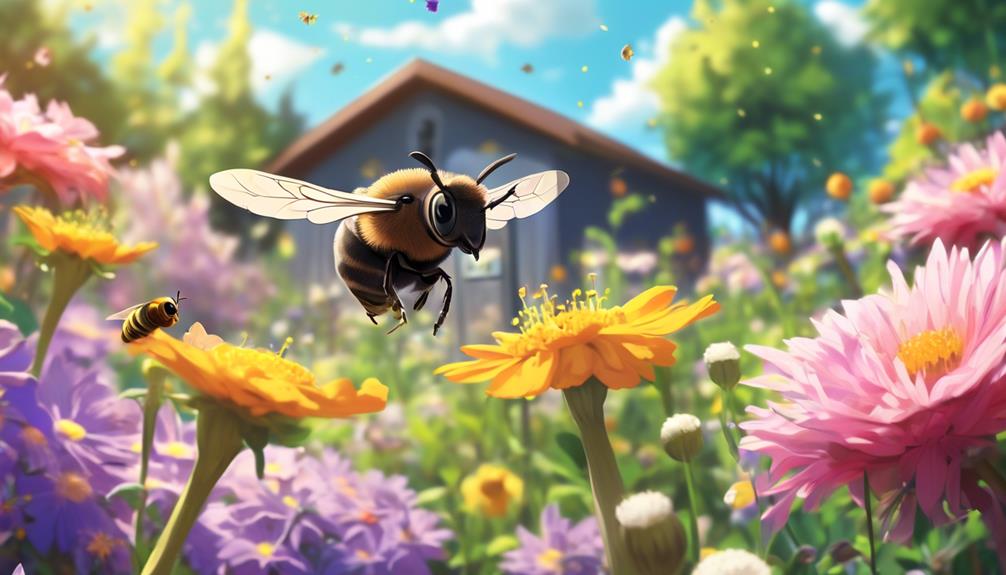
Managing Mason Bees effectively involves implementing a few key strategies to mitigate potential risks and damages.
The first method is providing a suitable habitat for the bees. You can use commercially available bee houses or create a DIY version with materials like untreated wood and paper straws. These habitats should be placed in a spot with morning sun exposure and protection from strong winds and predators.
The second strategy is regular maintenance of the bee house. It's crucial to replace used nesting materials each year to prevent the build-up of pests and diseases. You're also advised to harvest cocoons in late fall, clean them, and store them in a cool, safe place for winter. This action reduces the risk of parasitic infection and promotes a healthy bee population.
The Benefits of Mason Bees

After implementing these necessary precautions to protect your mason bees, it's essential to recognize the numerous benefits these industrious insects bring to our ecosystem. Firstly, mason bees are extremely efficient pollinators. Their body structure enables them to carry pollen on their abdomen, which then gets transferred to flowers as they forage.
Below is a table highlighting some primary benefits and their significance:
Benefit | Explanation | Significance |
|---|---|---|
Efficient Pollination | Mason bees carry pollen on their abdomen, leading to effective transfer | Promotes biodiversity and plant reproduction |
Gentle Nature | They are non-aggressive and rarely sting | Safe for human interaction |
Low Maintenance | They don't require a hive or extensive care | Easy to encourage in gardens |
Boost Crop Production | Effective pollination leads to improved crop yield | Beneficial for agriculture |
Ecosystem Balance | They support a healthy ecosystem | Helps maintain environmental health |
Mason bees also promote biodiversity, as their pollination encourages the growth of various plant species. Their gentle nature makes them less threatening than other bee species. They require little maintenance, making it easy to encourage their presence in your garden. Lastly, by boosting crop production and maintaining a balanced ecosystem, mason bees play a crucial role in our world.
Conclusion
So, you've discovered Mason bees aren't your typical destructive pests. Indeed, they can cause minor damage to wooden structures, but they're not your enemy. With proper management, the risks are quite manageable.
Don't overlook the immense benefits they bring to your garden. They're excellent pollinators, boosting your plant health and productivity. So, rather than fearing them, learn to coexist.
After all, the positives of having Mason bees around significantly outweigh the negatives.

